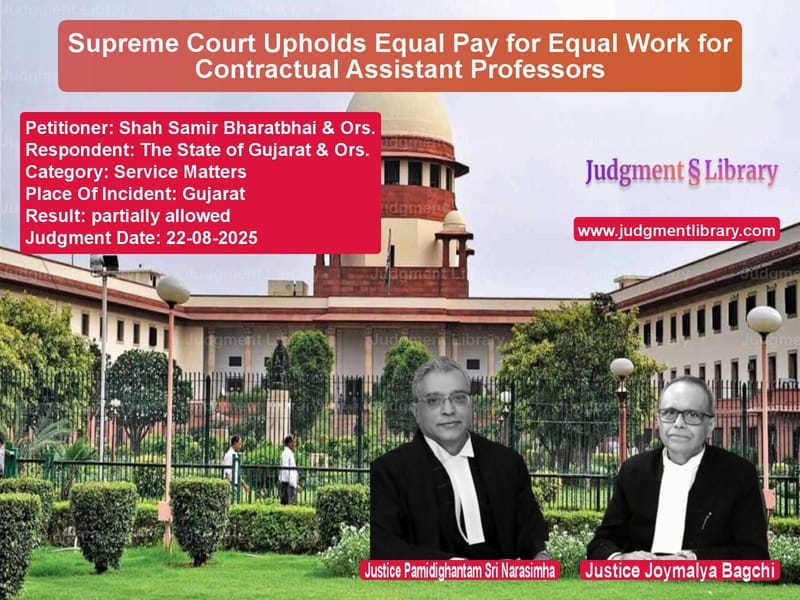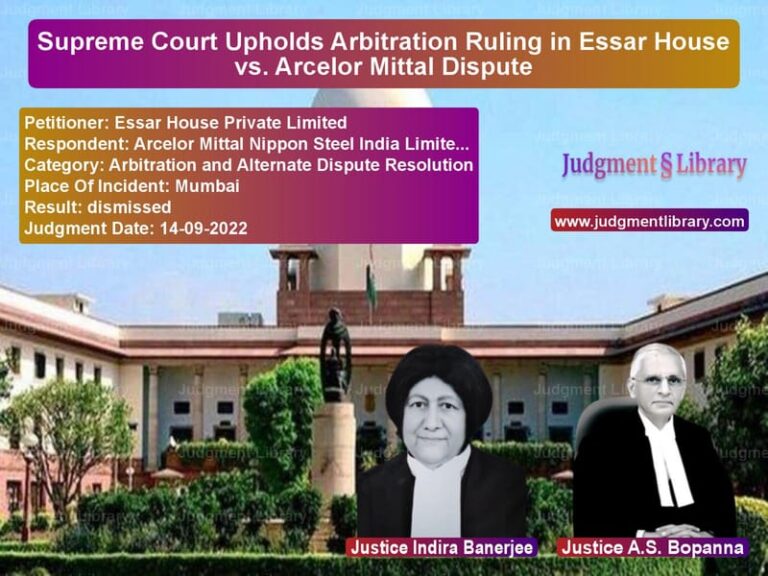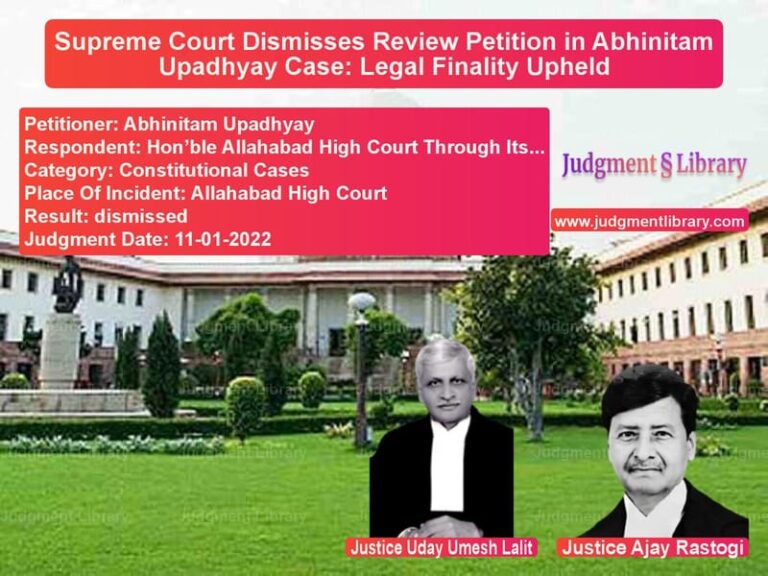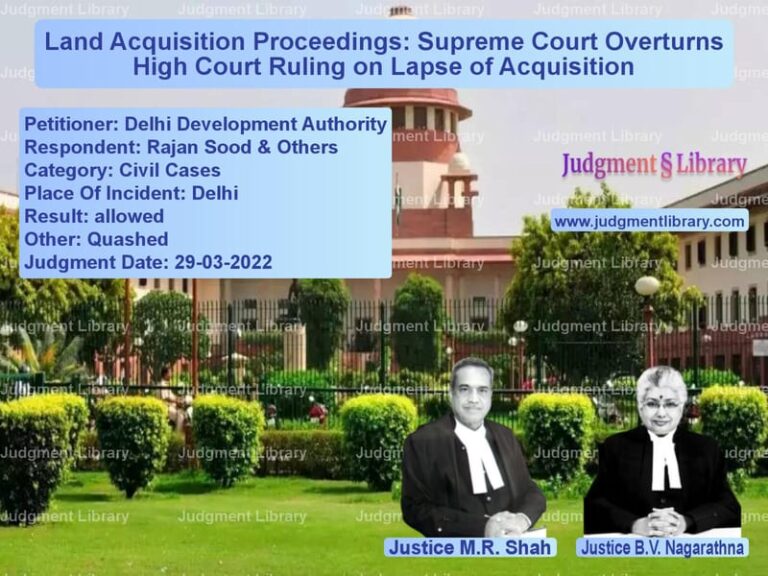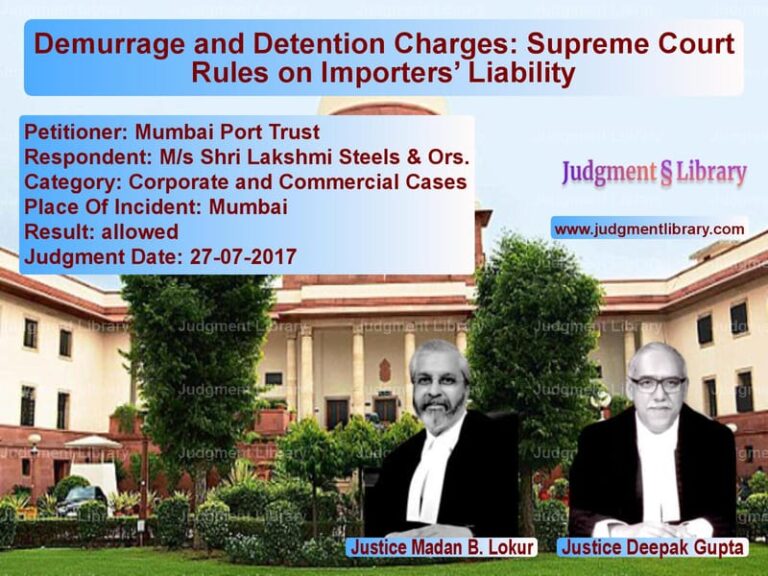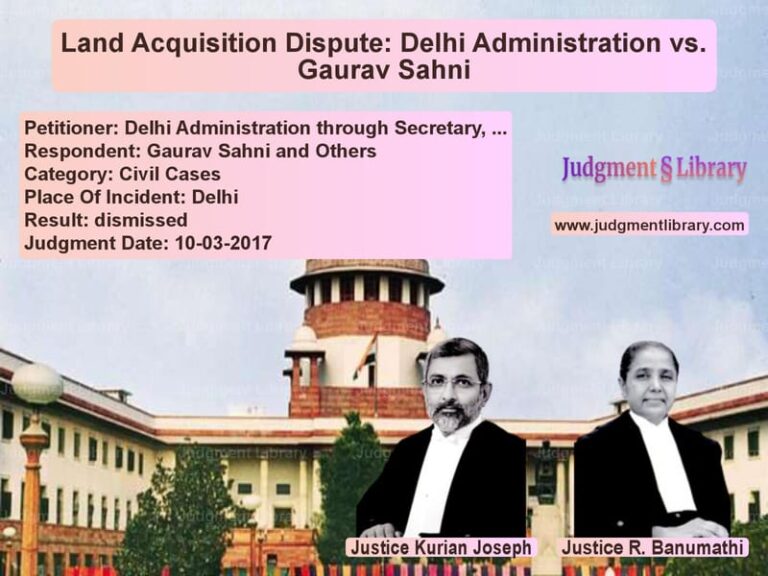Supreme Court Upholds Equal Pay for Equal Work for Contractual Assistant Professors
In a landmark judgment that reinforces the constitutional principle of equal pay for equal work, the Supreme Court of India has delivered a significant verdict in favor of contractual Assistant Professors in Gujarat government colleges. The Court’s ruling, delivered on August 22, 2025, addresses the long-standing grievance of educators who have been working on contractual basis for nearly two decades while receiving substantially lower salaries compared to their regularly appointed counterparts performing identical duties. The judgment not only provides financial relief to hundreds of Assistant Professors but also sends a strong message about the dignity and fair treatment of educators in India.
The case involved multiple appeals from both the State of Gujarat and contractual Assistant Professors, stemming from conflicting judgments by the Gujarat High Court. While the State sought to overturn directions granting minimum pay scales to contractual faculty, the Assistant Professors challenged a Division Bench judgment that had completely dismissed their claims for pay parity. The Supreme Court’s ruling brings clarity to this long-pending issue and establishes important principles regarding the application of equal pay for equal work in the education sector.
Background of the Case
The dispute has its origins in the staffing crisis in Government Engineering and Polytechnic Colleges in Gujarat, where a significant number of posts remained vacant for over 20 years. To address this shortage, the State Government resorted to ad hoc and contractual appointments through resolutions in 2008. Of the 2720 sanctioned posts, only 923 were filled by regularly appointed staff, while 158 posts were filled by ad hoc appointments and 902 posts through contractual appointments, leaving 737 posts vacant.
The contractual Assistant Professors, despite having the same qualifications and performing identical duties as their regular counterparts, were paid fixed salaries of Rs. 25,000 for Diploma Colleges and Rs. 30,000 for Degree Colleges, while regular Assistant Professors received substantially higher salaries with annual increments and other benefits. This disparity continued for years, prompting the contractual faculty to approach the courts seeking pay parity.
The legal journey began with writ petitions filed in 2015 by two categories of Assistant Professors – those appointed on ad hoc basis and those on contractual basis. The Single Judge of Gujarat High Court, in a common judgment dated September 7, 2016, partly allowed both categories of petitions. For contractual Assistant Professors, the Court directed that they “shall be paid the minimum of the pay scale so far as the post of Lecturer is concerned with all other allowances attached to the same with effect from January 2015.”
Arguments by the State of Gujarat
The State of Gujarat, in its appeals before the Supreme Court, contended that the contractual Assistant Professors were appointed based on specific contracts and their terms and conditions must be governed by these contracts. The State argued that “the selection process as well as the nature of appointment is starkly distinct and, as such, claim for parity with ad hoc employees, much less regularly appointed Assistant Professors, is impermissible.”
The State further submitted that “once appointed on the basis of a contract, the learned single Judge as well as the Division Bench could not have granted them pay and allowances at the rate of the minimum scale of Assistant Professors.” The State also objected to the payment of arrears at the rate of 8% from the last three years preceding the filing of the writ petitions.
Arguments by the Contractual Assistant Professors
The contractual Assistant Professors, through their counsel, emphasized that they were equally qualified and selected through a proper selection process. They highlighted that “their appointment was made through an open selection process as adopted by the State department by forming a selection committee constituted in terms of the Government resolution dated 20.05.2008 issued by the Education department.”
The selection process involved advertisements for sanctioned vacant posts, written examinations, interviews, and preparation of merit lists. The Assistant Professors argued that “they are discharging the same responsibilities, teaching to the same students, in the same Government Engineering Colleges and Polytechnics. There is no functional difference pointed out by the State in their work.”
They presented a comparative chart showing the stark disparity in salaries: while contractual Assistant Professors with M.Tech qualifications were stuck at Rs. 30,000 per month since 2012, ad hoc appointees with B.Tech qualifications saw their salaries increase from Rs. 34,000 to Rs. 1,16,000, and regular appointees with M.Tech qualifications received Rs. 1,36,952 per month by 2025.
Supreme Court’s Analysis and Reasoning
The Supreme Court, comprising Justices Pamidighantam Sri Narasimha and Joymalya Bagchi, began its analysis by emphasizing the importance of treating educators with dignity. The Court observed that “Academicians, lecturers and professors are the intellectual backbone of any nation, as they dedicate their lives to shaping the minds and character of future generations.”
The Court made a poignant observation about the treatment of teachers in society: “It is just not enough to keep reciting gurubramha gururvishnu gurdevo maheshwarah at public functions. If we believe in this declaration, it must be reflected in the way the nation treats its teachers.”
Addressing the State’s argument about contractual appointments, the Court noted that “More than the justifiable claim for parity, it is rather disturbing to see how lecturers, holding the post of Assistant Professors, continue to be paid and subsist on such low salaries for almost two decades.”
The Court extensively discussed the principle of equal pay for equal work, referring to its earlier decision in Sabha Shanker Dube v. Divisional Forest Officer, where it was held that “temporary employees are entitled to minimum of the pay scales as long as they continue in service.”
The Court emphasized that “The facts of the present case are rather egregious. Assistant professors appointed on contractual basis during 2011 to 2025 have been working at abysmally low monthly emoluments for the last two decades. While there is no material whatsoever drawing out a distinction between the duties and functions performed by them and that of their colleagues appointed regularly or on ad hoc basis, they continue to draw monthly salary of Rs. 30,000/–.”
Regarding the State’s appeal against the grant of minimum pay scale, the Court upheld the High Court’s reasoning that “the present respondents though contractual appointees are equally eligible and qualified to be appointed on the post of lecturers. Their appointment was made through a open selection process… There cannot be dispute about unit applicants possessing the requisite qualifications as per the statutory recruitment rules prevalent at the relevant time.”
The Court also approved the High Court’s finding that “they are discharging the same responsibilities, teaching to the same students, in the same Government Engineering Colleges and Polytechnics. There is no functional difference pointed out by the State in their work. Hence, in our opinion no discriminatory treatment ought to have been given by State vis-a-vis ad hoc lecturers appointed prior to them. The principle of ‘equal pay for equal work’ will be applicable in such circumstances.”
The Disturbing Reality of Educator Compensation
The Supreme Court expressed deep concern about the compensation structure for Assistant Professors in Gujarat, noting that “It is disturbing that Assistant Professors are getting monthly emoluments of Rs. 30,000/–. It is high time that the State takes up the issue and rationalize the pay structure on the basis of functions that they perform.”
The Court highlighted the stark disparities revealed in the comparative chart presented by the appellants, which showed that contractual Assistant Professors with M.Tech qualifications received the same Rs. 30,000 monthly salary from 2012 to 2025, while ad hoc appointees with only B.Tech qualifications saw their salaries increase from Rs. 34,000 to Rs. 1,16,000 during the same period, and regular appointees received Rs. 1,36,952 by 2025.
Resolution of Conflicting High Court Judgments
The Supreme Court also addressed the issue of conflicting judgments from the Gujarat High Court. While in the first batch of cases, the Division Bench had dismissed the State’s appeals and upheld the grant of minimum pay scale to contractual Assistant Professors, in the subsequent batch involving later appointees, another Division Bench completely dismissed the writ petitions.
The Court criticized this approach, stating that “There was no doubt about the fact that the learned single Judge should have followed the decisions in Acharya Madhavi (Supra) and Gohel Vishal Chhaganbhai (supra). However, the consequence of not following the said decisions is not to set-aside the decision of the single Judge and dismiss the writ petitions altogether. The Division Bench should have set-aside the order passed by the single Judge and disposed of the writ petitions in terms of the decisions in Acharya Madhavi (Supra) and Gohel Vishal Chhaganbhai (supra).”
The Court further observed that “By not adopting the natural course of disposing of the writ petitions in terms of the decided cases, the Division Bench fell into the same error as that of the learned single Judge. Division Bench should have followed the decisions of two co-ordinate Benches of the same Court.”
Final Directions and Relief Granted
The Supreme Court dismissed the State’s appeals and allowed the appeals filed by the contractual Assistant Professors. The Court directed that “the contractually appointed Assistant Professors, shall be entitled to the minimum pay scale admissible to Assistant Professors. Arrears calculated at the rate of 8% shall be paid from three years preceding the date of filing of the writ petitions.”
The Court also kept open the possibility for the Assistant Professors to seek further relief, noting that “We leave it open to the appellants and such similarly placed Assistant Professors to work out their remedies before the High Court in view of their continued service for a long period. It is for the High Court to consider the same and pass orders as per law.”
This judgment not only provides immediate financial relief to hundreds of contractual Assistant Professors in Gujarat but also reinforces the constitutional principle of equal pay for equal work. It serves as an important precedent for similar cases across the country and emphasizes the need for fair compensation for educators, who play a crucial role in nation-building.
Petitioner Name: Shah Samir Bharatbhai & Ors..Respondent Name: The State of Gujarat & Ors..Judgment By: Justice Pamidighantam Sri Narasimha, Justice Joymalya Bagchi.Place Of Incident: Gujarat.Judgment Date: 22-08-2025.Result: partially allowed.
Don’t miss out on the full details! Download the complete judgment in PDF format below and gain valuable insights instantly!
Download Judgment: shah-samir-bharatbha-vs-the-state-of-gujarat-supreme-court-of-india-judgment-dated-22-08-2025.pdf
Directly Download Judgment: Directly download this Judgment
See all petitions in Employment Disputes
See all petitions in Contractual Employment
See all petitions in Public Sector Employees
See all petitions in Judgment by P.S. Narasimha
See all petitions in Judgment by Joymalya Bagchi
See all petitions in partially allowed
See all petitions in supreme court of India judgments August 2025
See all petitions in 2025 judgments
See all posts in Service Matters Category
See all allowed petitions in Service Matters Category
See all Dismissed petitions in Service Matters Category
See all partially allowed petitions in Service Matters Category

